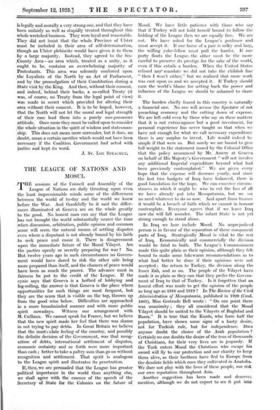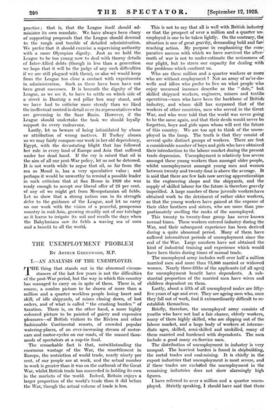THE LEAGUE OF NATIONS AND MOSUL
:TIM sessions of the Council and Assembly of the League of Nations are daily thrusting upon even -1- the least impressionable minds some of the differences .between the world of to-day and the world we knew ;before the War. And thankfully be it said the differ- ences illuminated at Geneva are on the whole greatly to the good. No honest man can say that the League has not brought the world substantially nearer the time when discussion, arbitration, public opinion and common sense will seem the natural means of settling disputes 'even where a disputant is not already bound by his faith to seek peace and ensue it. There is disagreement upon the immediate future of the Mosul Vilayet. Are the parties openly or secretly preparing for war ? No. But twelve years ago in such circumstances no Govern- ment would have dared to risk the other side being more prepared than itself, and the chances of peace would have been so much the poorer. The advance must in fairness be put to the credit of the League. If the cynic says that Geneva is a hotbed of lobbying and log-rolling, the answer is that Geneva is the place where opportunities for such things are most frequent, but they are the scum that is visible on the top, thrown up from the good wine below. Difficulties are approached in a more broadminded manner and with more public spirit nowadays. Witness our arrangement with M. Caillaux. We cannot speak for France, but we believe that the new spirit made her feel that there was shame in not trying to pay debts. In Great Britain we believe that the inarticulate feeling of the country, and possibly the definite decision of the Government, was that recog- nition of debts, international settlement of disputes, economic certainty and so forth were more important than cash ; better to take a paltry sum than go on without recognition and settlement. That spirit is analogous to the League spirit and illustrates its penetration.
If, then, we are persuaded that the League has greater political importance in the world than anything else, we shall agree with the essence of the speech of the Secretary of State for the Colonies on the future of Mosul. We have little patience with those who say that if Turkey will not hold herself bound to follow the bidding of the League then we are equally free. We are not. We have asked for the League's guidance and must accept it. If one horse of a pair is sulky and lazy, the willing yoke-fellow must pull the harder. If one party flouts the League, the other must be the more careful to preserve its prestige for the sake of the world, even if this entails a burden. When the United States refused any mandate we did not take the childish line " then I won't either," but we realized that more work was cast upon us and we accepted it. If Turkey should earn the world's blame for setting back the power and influence of the League we should be ashamed to share it.
The burden chiefly feared in this country is naturally a financial one. No one will accuse the Spectator of not preaching economy and the cutting down of expense. We are left cold even by those who say on these matters that it is not extravagance but a good investment, for personal experience has never taught us that when we have not enough for what we call necessary expenditure there is any surplus to invest. Life would indeed be simple if that were so. But surely we are bound to give full weight to the statement issued by the Colonial Office that the policy announced by Mr. Amery at Geneva on behalf of His Majesty's Government " will not involve any additional Imperial expenditure beyond what had been previously contemplated." We are given every hope that the expense will decrease yearly, and since the last two budgets of Iraq have balanced, there is good foundation for the hope. We can conceive circum- stances in which it might b3 wise to cut the loss of all we have already put into Mesopotamia, but we t..ee no need whatever to do so now. And apart from finance it would be a breach of faith which we cannot in honour contemplate. Everyone agrees that if we leave Iraq now she will fall asunder. The infant State is not yet strong enough to stand alone.
In Iraq we here include Mosul. No unprejudiced person is in favour of the separation of these component parts of Iraq. Strategically Mosul is vital to the rest of Iraq. Economically and commercially the division would be fatal to both. The League's Commissioners made this quite plain as their opinion, although they felt bound to make some lukewarm recommendations as to what had better be done if their opinions were not accepted ; the return to Turkey, the division along the lesser Zab, and so on. The people of the Vilayet have made it as plain as they can that they prefer the Govern- ment of Iraq to that of Turkey. Is it forgotten that an honest effort was made to get the opinion of the people so long ago as 1918 and 1919 ? In The Review of the Civil Administration of Mesopotamia, published in 1920 (Cmd. 1061), Miss Gertrude Bell wrote : " On one point there was unanimity ; they all considered that the Mosul Vilayet should be united to the Vilayets of Baghdad and Basra." It is true that the Kurds, who form half the population, have shown some signs of a hasty desire, not for Turkish rule, but for independence. Does anyone doubt the choice of the Arab population ? Certainly no one doubts the desire of the tens of thousands of Christians, for their very lives are in jeopardy. If the Turk enters Mosul the Christians who escape his sword will fly to our protection and our charity to keep them alive, as their brethren have fled to Europe from the desolate fields which once they cultivated in Anatolia. We dare not play with the lives of these people, nor risk our own reputation throughout Asia. .
Another suggestion has been made and deserves mention, although we do not expect to see it put into practice ; that is, that the League itself should ad- minister its own mandate. We have always been chary of supporting proposals that the League should descend to the rough and tumble of detailed administration. We prefer that it should exercise a supervising authority with a more Olympian dignity. Just as we hold the League to be too young now to deal with thorny details of Inter-Allied debts (though in less than a generation we hope that it will be the judge of any such difficulties if we are still plagued with them), so also we would keep from the League too close a contact with experiments in administration. Such as there have been have not been great successes. It is beneath the dignity of the League, as we see it, to have to settle on which side of a street in Dantzig a red pillar box may stand, and we have had to criticize more sternly than we liked the ineffectual control in detail over its representatives who are governing in the Saar Basin. However, if the League should undertake the task we should loyally support its every endeavour.
Lastly, let us beware of being intimidated by abuse or attribution of wrong motives. If Turkey abuses us we may fairly compare our work in her old dependency, Egypt, with the devastating blight that has followed her rule in every land of Europe and Asia that suffered under her dead hand. If the cry is raised that oil is the aim of all our post-War policy, let us not be deterred. It is not worth while to argue that oil, so far from the sea as Mosul is, has a very speculative value ; and perhaps it would be unworthy to remind a possible leader in such criticism that at San Remo in 1920 she was ready enough to accept our liberal offer of 25 per cent. of any oil we might get from Mesopotamian oil fields. Let us show that a strong nation can in its strength defer to the guidance of the League, and let us carry on our work with the vision of a peaceful, prosperous country in mid-Asia, growing steadily out of our tutelage as it learns to irrigate its soil and recalls the days when the Babylonians saw its fields a waving sea of corn and a benefit to all the world.











































 Previous page
Previous page